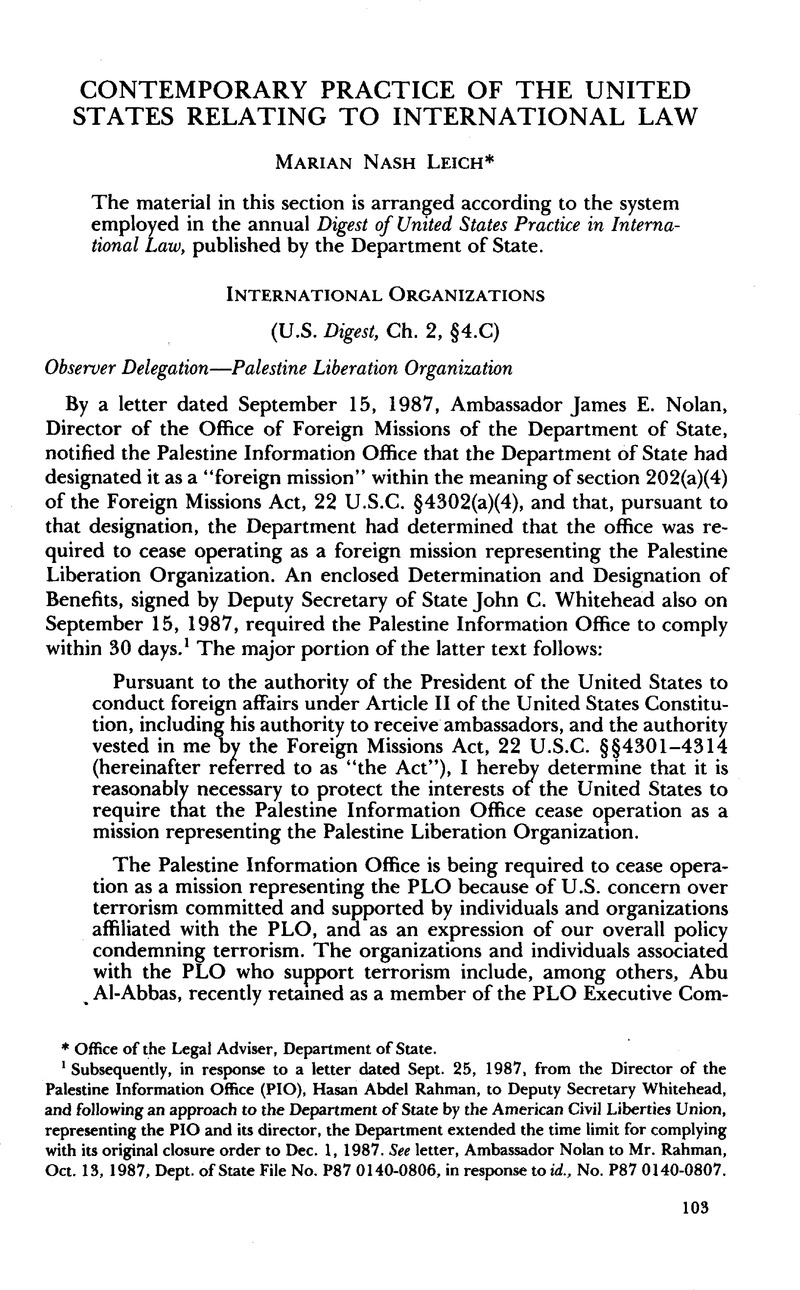Published online by Cambridge University Press: 27 February 2017

1 Subsequently, in response to a letter dated Sept. 25, 1987, from the Director of the Palestine Information Office (PIO), Hasan Abdel Rahman, to Deputy Secretary Whitehead, and following an approach to the Department of State by the American Civil Liberties Union, representing the PIO and its director, the Department extended the time limit for complying with its original closure order to Dec. 1, 1987. See letter, Ambassador Nolan to Mr. Rahman, Oct. 13, 1987, Dept. of State File No. P87 0140-0806, in response to id., No. P87 0140-0807.
2 Dept. of State File No. P87 0123–1609, 52 Fed. Reg. 37,035–36 (1987).
3 Dept. of State File No. P87 0123–1613, 52 Fed. Reg. 37,035 (1987).
1 S. 1437 and H.R. 3036, 100th Cong., 1st Sess. (1987).
2 See 78 AJIL 656 (1984).
3 Dept. of State File No. P87 0126–0965.
4 Dept. of State, Pub. No. 9533, Guidance for Law Enforcement Officers (1987).
5 For the circular note to the Chiefs of Mission at Washington, May 21, 1986, regarding the possession and carrying of firearms by foreign diplomatic or consular personnel, see Dept. of State File No. P86 0069-0831.
6 Dept. St. Bull., No. 2127, October 1987, at 29; Dept. of State, Current Policy No. 993, Diplomatic Immunity and U.S. Interests (1987).
In addition to diplomats and administrative and technical staff of embassies and their families, criminal immunity in the United States is extended to diplomats at the Organization of American States and members of missions to the United Nations, as well as a small number of persons at the World Bank and International Monetary Fund.
On Oct. 8, 1987, the Senate agreed to a floor amendment to the Foreign Relations Authorization Act, Fiscal Year 1988, S. 1394, proposing the Diplomatic Immunity Abuse Prevention Act. That Act would have required the Secretary of State, inter alia, to request that sending states waive the diplomatic immunity of individuals believed to have committed serious criminal offenses (particularly crimes of violence), in order to permit their prosecution. See 133 Cong. Rec. S13.795–97 (daily ed. Oct. 8, 1987).
The Senate/House committee of conference deleted the proposed Act and substituted a requirement for the Secretary of State to (1) study the feasibility of increasing the minimum liability insurance coverage required of members of foreign missions and their families, and (2) report within 90 days on various other issues that the proposed Act would have addressed. The substitute provision became §137 of the Foreign Relations Authorization Act, Fiscal Years 1988 and 1989, approved as Pub. L. No. 100–204, Dec. 22, 1987. See H.R. Rep. No. 475, 100th Cong., 1st Sess. 123–25 (1987).
1 See 79 AJIL 1051 (1985).
2 Dept. of State File No. P87 0126–0968.
1 S. Treaty Doc. 8, 100th Cong., 1st Sess. (1987).
2 Agreement between the United States and the United Kingdom Concerning the Cayman Islands and Narcotics Activities, July 16, 1984, reprinted in 24 ILM 1110 (1985) (entered into force Aug. 29, 1984, extended for a 6-month period Nov. 26, 1986, and for a further 6-month period May 29, 1987).
3 See Treaty between the United States and Italy on Mutual Assistance in Criminal Matters, with memorandum of understanding, Nov. 9, 1982 (entered into force Nov. 13, 1985); Treaty between the United States and the Netherlands on Mutual Assistance in Criminal Matters, with exchange of notes, June 12, 1981,TIASNo. 10734 (entered into force Sept. 15, 1983); Treaty between the United States and Switzerland on Mutual Assistance in Criminal Matters, with related notes, May 25, 1973, 27 UST 2019, TIAS No. 8302 (entered into force Jan. 23, 1977); and Treaty between the United States and Turkey on Extradition and Mutual Assistance in Criminal Matters, June 7, 1979, 32 UST 3111, TIAS No. 9891 (entered into force Jan. 1, 1981).
The United States has also signed a Mutual Legal Assistance Treaty with the Republic of Colombia, Aug. 20, 1980, and a Convention on Mutual Assistance in Criminal Matters with the Kingdom of Morocco, Oct. 17, 1983. Although the Senate has voted advice and consent to ratification of both and President Reagan has signed the U.S. instruments of ratification, they have not yet entered into force.
4 S. Treaty Doc. 8, supra note 1, at V–X.
1 International Convention for the Prevention of Pollution from Ships, done Nov. 2, 1973, reprinted in 12 ILM 1319 (1973), and Protocol, done Feb. 17, 1978, reprinted in 17 ILM 546 (1978).
2 S. Treaty Doc. No. 3, 100th Cong., 1st Sess., at v-vi (1987). See also S. Exec. Rep. No. 8, 100th Cong., 1st Sess. (1987).
Testifying in support of Annex V at a committee hearing on July 31, 1987, Senator John H. Chafee noted that the Soviet Union had recently become the 28th nation to ratify it and that, if the Senate approved the resolution of advice and consent, nations representing more than 50% of the world’s shipping tonnage would have ratified Annex V, which would give it the force of international law. Id. at 8.
3 133 Cong. Rec. S15, 846 (daily ed. Nov. 5, 1987).
4 Id. at H8564–76 (daily ed. Oct. 13, 1987).
1 Convention for the Protection of the Ozone Layer, done Mar. 22, 1985, S. Treaty Doc. No. 9, 99th Cong., 1st Sess. (1985). See 80 AJIL 157 (1986). The Senate voted its advice and consent to ratification on July 24, 1986. 132 Cong. Rec. S9615–18 (daily ed. July 24, 1986).
2 For the text of the Montreal Protocol, see S. Treaty Doc. No. 10, 100th Cong., 1st Sess. (1987); 26 ILM 1550(1987).